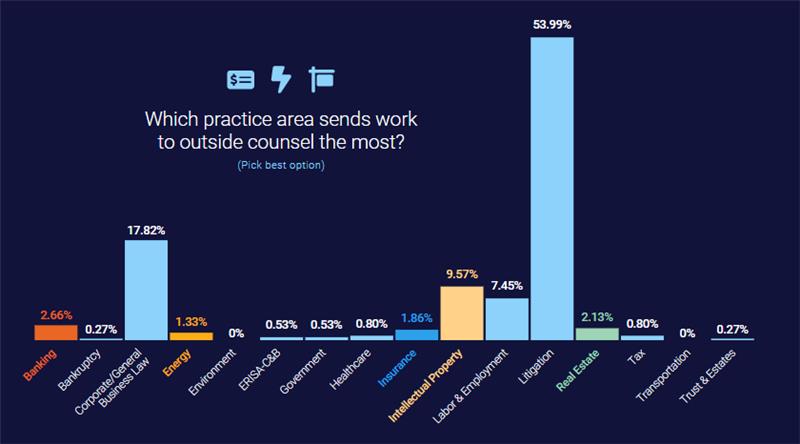The recent BTI Consulting Group report projecting a 6.9% increase in outside counsel spending, particularly in high-stakes litigation, aligns closely with the insights derived from Leopard Solutions’ Corporate Counsel survey data. This anticipated spending surge, largely driven by complex regulatory environments, escalating litigation, and industry-specific needs, provides a timely lens through which to interpret Leopard Solutions’ findings on client priorities, practice area demands, and insourcing versus outsourcing strategies.
Key Takeaways from Leopard Solutions Data in Relation to BTI Findings
1. Increased Demand in Litigation and Regulatory Work
According to Leopard Solutions’ survey, top legal decision-makers are prioritizing external support in areas like labor and employment, complex litigation, and regulatory compliance, aligning with BTI’s forecast of increased spending in litigation and labor law. This trend suggests that corporate legal departments are grappling with intricate legal challenges that extend beyond their in-house capabilities. Leopard’s data shows that litigation, labor and employment, and complex regulatory work are among the most outsourced due to the specialized expertise they require. These practice areas are more likely to see increased demand for outside counsel, given the pressure on in-house teams to manage both ongoing and emerging legal risks.

2. Value and Efficiency as Competitive Advantages for Midsize Firms Leopard Solutions data reveals that 88% of respondents prioritize “Responsiveness” and 86% prioritize “Legal Expertise” when choosing outside counsel, underscoring a strong desire for efficient, high-quality service. With rising in-house workloads and regulatory pressures, corporate counsel is increasingly seeking law firms that can deliver quick, reliable solutions and proactive strategies. This focus on value and expertise positions midsize and smaller firms well in the current landscape, particularly for companies looking to balance quality with budget-conscious decisions. As larger firms continue to raise their rates, firms that can demonstrate superior responsiveness and cost-effectiveness stand to capture significant market share.

3. Strategic Insourcing to Manage Costs and Enhance Control
Leopard Solutions’ findings also indicate that 40% of corporate legal departments aim to handle over 75% of their work in-house, which reflects a broader industry shift towards insourcing as a cost-control measure. This aligns with BTI’s insight that in-house departments are experiencing increased internal pressure due to workload and regulatory complexities. By handling routine or familiar legal work in-house, departments can focus their budgets on external expertise for high stakes matters. However, as Leopard’s data suggests, while insourcing is preferred, capacity limitations and resource constraints still lead many corporate legal teams to outsource specialized work where in-house expertise may fall short.

4. Shifts Toward Alternative Fee Arrangements and Smaller Firms
In response to the rising costs of traditional law firm services, Leopard Solutions’ data indicates an increased interest in Alternative Fee Arrangements (AFAs) and a move towards engaging smaller firms that offer competitive pricing. AFAs, though traditionally viewed with hesitation, are becoming essential as clients seek transparent, predictable pricing to better manage legal spending. Smaller firms that adopt flexible pricing structures may see new opportunities emerge as larger firms face increased pressure to justify their higher rates. This shift not only aligns with clients’ cost-control goals but also offers firms a chance to build longer-term, trust-based relationships.
5. Sector-Specific Insights: Technology and Pharmaceutical Industries
Leopard’s survey data also highlights industry-specific needs that complement BTI’s findings. For instance, the technology sector has been identified as requiring extensive external support across multiple legal areas, including cybersecurity, privacy, intellectual property, and employment law. This corresponds to the complex regulatory demands and rapid pace of change in the tech industry. Similarly, the pharmaceutical sector, facing rigorous compliance requirements and intellectual property considerations, is a major source of legal work outsourced to specialized firms. This trend is reflected in Leopard’s findings, which show high demand in industries with unique, complex regulatory landscapes.
Conclusion: Strategic Opportunities for Law Firms
The convergence of insights from BTI and Leopard Solutions underscores a broader trend: corporate legal departments are navigating an increasingly challenging legal landscape with a dual focus on efficiency and specialized expertise. Law firms that can offer high responsiveness, industry-specific knowledge, and cost-effective solutions are well-positioned to meet these evolving needs. By leveraging insights into client priorities and market trends, law firms—particularly those midsize firms offering AFAs and niche expertise—have a unique opportunity to thrive in this competitive, value-driven environment.
How Leopard PROWESS Addresses Client Challenges

Leopard PROWESS is uniquely positioned to address the complex challenges highlighted in both BTI and Leopard Solutions’ recent surveys by providing corporate legal departments with a powerful tool to optimize outside counsel selection and management. With a comprehensive database covering over 5,500 law firms and 388,000 attorneys, PROWESS enables legal teams to quickly identify firms with the right expertise in high-demand areas like complex litigation, regulatory compliance, and labor law—key practice areas where outside counsel spending is expected to rise. The platform’s customizable law firm panels, detailed performance metrics, and integrated communication workflows help organizations not only streamline their selection process but also track responsiveness, legal quality, and adherence to Alternative Fee Arrangements (AFAs). These features allow in-house teams to balance cost-efficiency with specialized legal needs, while PROWESS’s diversity and inclusion tools support broader industry goals of building diverse legal teams. By simplifying external counsel management through a single, data-driven platform, Leopard PROWESS empowers legal departments to make agile, well-informed decisions and maintain control over rising legal costs and regulatory pressures.
